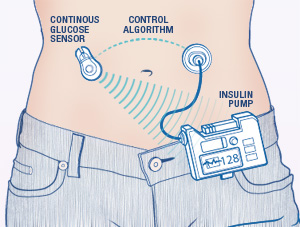- Home
- Editorial
- News
- Practice Guidelines
- Anesthesiology Guidelines
- Cancer Guidelines
- Cardiac Sciences Guidelines
- Critical Care Guidelines
- Dentistry Guidelines
- Dermatology Guidelines
- Diabetes and Endo Guidelines
- Diagnostics Guidelines
- ENT Guidelines
- Featured Practice Guidelines
- Gastroenterology Guidelines
- Geriatrics Guidelines
- Medicine Guidelines
- Nephrology Guidelines
- Neurosciences Guidelines
- Obs and Gynae Guidelines
- Ophthalmology Guidelines
- Orthopaedics Guidelines
- Paediatrics Guidelines
- Psychiatry Guidelines
- Pulmonology Guidelines
- Radiology Guidelines
- Surgery Guidelines
- Urology Guidelines
Artificial pancreas a safe,effective Rx option for T1DM : BMJ

The artificial pancreas is a system that measures blood sugar levels using a continuous glucose monitor (CGM) and transmits this information to an insulin pump that calculates and releases the required amount of insulin into the body, just as the pancreas does in people without diabetes.Dr.Eleni Bekiari at Aristotle University of Thessaloniki, Greece and the team set out to investigate the effectiveness and safety of artificial pancreas systems in people with type 1 diabetes.The researchers found that Artificial pancreas is a safe and effective treatment for type 1 diabetes. A review of the available evidence has been published by The BMJ today.
According to the researchers, Use of an artificial pancreas is associated with better control of blood sugar levels for people with type 1 diabetes compared with standard treatment and Emerging treatment can reduce time spent in high and low blood sugar levels.The findings show that artificial pancreas treatment provides almost two and a half extra hours of normal blood glucose levels (normoglycaemia) a day while reducing time in both high (hyperglycaemia) and low (hypoglycaemia) blood glucose levels.
While further research is needed to verify the findings, the researchers say these results support the view that “artificial pancreas systems are a safe and effective treatment approach for people with type 1 diabetes.”
They reviewed the results of 41 randomised controlled trials involving over 1000 people with type 1 diabetes, that compared artificial pancreas systems with other types of insulin based treatment, including insulin pump therapy.They found that the artificial pancreas was associated with almost two and a half additional hours in normoglycaemia compared with other types of treatment when used overnight and over a 24 hour period.
Use of the artificial pancreas also reduced time spent in hyperglycaemia by approximately two hours - and in hypoglycaemia (20 minutes less) - compared to other types of therapy.
Further analyses to test the strength of the associations for different devices and in different settings were consistent, suggesting that the results are robust.
As such, the authors say that their review provides a valid and up to date overview on the use of artificial pancreas systems for type 1 diabetes. However, they point out that most trials were at high or unclear risk of bias, had a small sample size and short duration, and therefore should be interpreted with caution.
Furthermore, they suggest more should be done to assess cost-effectiveness “to support adoption of artificial pancreas systems in clinical practice.”
The authors also recommend that future research should “explore artificial pancreas use in relevant groups of people with type 2 diabetes” and say “the effect of artificial pancreas use on quality of life and on reducing patient burden should be further explored.”
In a linked editorial, Professor Norman Waugh at the University of Warwick and colleagues, argue that closed loop systems have much to offer, “but we need better evidence to convince policymakers faced with increasing demands and scarce resources.”
For more details click on the link : doi: https://doi.org/10.1136/bmj.k1310

Disclaimer: This site is primarily intended for healthcare professionals. Any content/information on this website does not replace the advice of medical and/or health professionals and should not be construed as medical/diagnostic advice/endorsement or prescription. Use of this site is subject to our terms of use, privacy policy, advertisement policy. © 2020 Minerva Medical Treatment Pvt Ltd